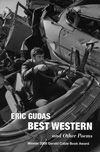Best Western
Best Western, like previous Gerald Cable Award Book Series winners, is composed almost entirely of narrative poems in accessible and familiar language intended to draw us easily and naturally into their scenes and stories. Gudas is especially adept at creating a credible and almost palpable atmosphere through small, seemingly ordinary detail, and in so doing, heightening his stories’ emotional impact. Each scene becomes, in essence, a minor drama of human experience, often one with which the reader can identify, if not empathize.
Best Western, like previous Gerald Cable Award Book Series winners, is composed almost entirely of narrative poems in accessible and familiar language intended to draw us easily and naturally into their scenes and stories. Gudas is especially adept at creating a credible and almost palpable atmosphere through small, seemingly ordinary detail, and in so doing, heightening his stories’ emotional impact. Each scene becomes, in essence, a minor drama of human experience, often one with which the reader can identify, if not empathize.
Pondering who will drink the orange juice left over at a business meeting leads him, through a series of related images, to recollect a woman he saw earlier sobbing into a pay phone, and leading us to wonder what sadness she is enduring, what griefs we all endure. The “suffocating summer dusk” of a drive the poet takes with his father to his grandmother’s funeral leads us to remember sad summer twilights we have ourselves known. In “A Glimpse,” the poet considers the janitor’s mop and bucket, the empty trash cans, and imagines the life of the man whose work it is to keep the hall so clean “it squeaks” beneath his feet. Do any of us notice the clean floors on which we walk, the trash cans emptied of the day’s debris?
Imagining “someone else’s pain” (his own, and yours and mine by implication) is the work the poet has assigned himself, from the orange juice in the collection’s first poem, to “Wherever,” one of the final pieces in the collection:
Once, to be
someone, I had
to some-
where—on the steps
of a cabin deep
in the woods, looking
up at the tin-foil sky:
or on a crowded
noonday New York
street…
It’s his work to be lots of “somewheres,” to speculate about the world as it is experienced by lots of someones.
The book’s final poem, “945 Pecan Place,” brings together all of his preoccupations, the precision of place/the address (945), “this run-down suburban house”; the small detail of daily life (“the checks we wrote all yesterday afternoon: $68.74 to Pacific Bell; $45 to Sutter Medical, etc.”; and the larger stories these details reveal); the daily grind (“since ten you’ve been standing behind a cash register passing vermicelli, skim milk, chicken breasts, and bottles of carbonated water over the scanner’s red eye”); and the emotional underpinnings of our lives (“But love, common as the oranges on our neighbors’ tree, spreads itself half-unseen beneath around us”). Bringing into the full light of day the half-seen is the work poet Eric Gudas has taken on, and he has succeeded at it.





